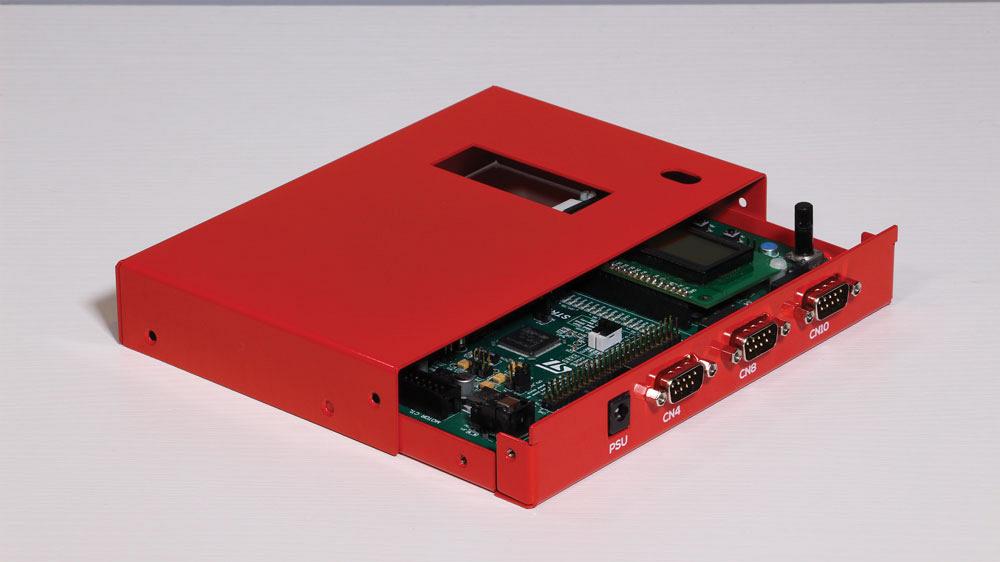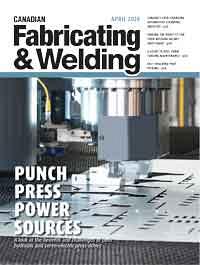Editor
- FMA
- The Fabricator
- FABTECH
- Canadian Metalworking
Protocase pivots with customers to help alleviate COVID-19 pressures
Sydney, N.S., business’s mass customization model lends support to biotech, medical products
- By Rob Colman
- Updated April 7, 2020
- April 7, 2020
- Article
- Health & Safety
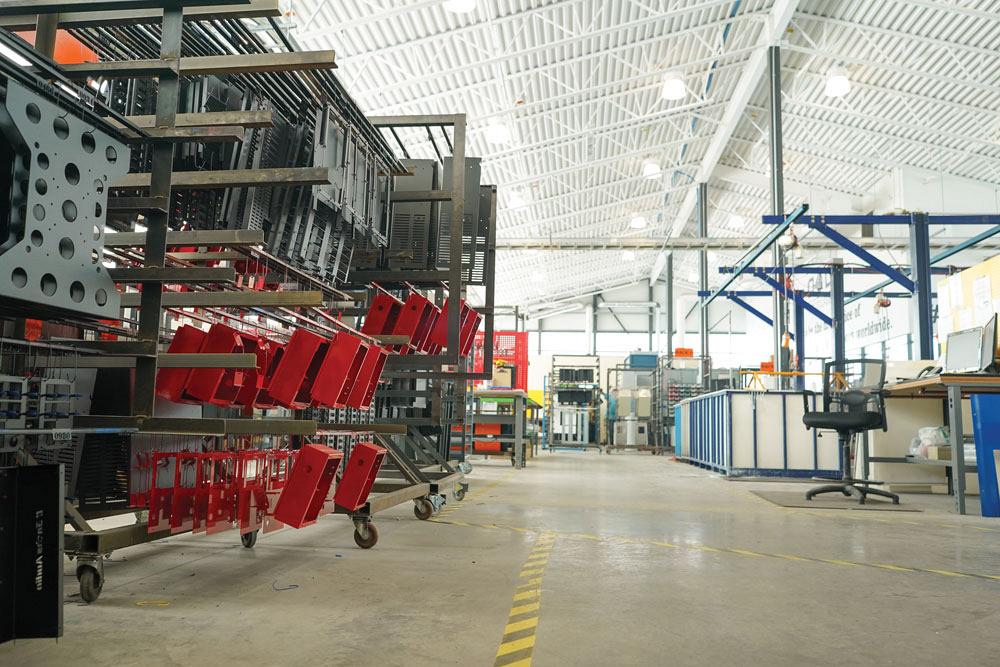
Protocase has more than 16,000 customers with typical fabricating runs of between 1 and 10 parts, and the company guarantees delivery in two to three days.
Some have likened the fight against COVID-19 internationally as a situation that puts industry and government on a wartime footing; everyone is working to retool operations to react to the urgent needs of the moment. Protocase is a company that is doing so as an extension of its work with existing clients. But company co-founder and Vice-President Doug Milburn points out that fabricators across the country should understand that any work they do to keep the economy moving is equally critical.
Mass Customization at Work
Protocase was founded in 2003 in reaction to issues Milburn and his co-founder Steve Lilley had trying to get enclosures built for very small-run, custom products they were developing. Shops could make the products, but they couldn’t always paint or silkscreen them, and many just didn’t want to work with such small quantities.
“I completely understand why a normal fab shop wouldn’t want to do this work,” said Milburn. “It’s tough.”
The work that Protocase does is necessarily software development-intensive, and much of it is automated. The company has more than 16,000 customers with typical fabricating runs of between 1 and 10 parts, and Protocase guarantees delivery in two to three days. That means that programming laser cutting or bending on the floor just isn’t an option. It all has to be managed in the office.
While you might think such short runs play havoc with metal supplies, Milburn is philosophical about it.
“We have a very sophisticated work flow developed through our software,” he said. “Ours is a very data-rich environment, so it means we’re a little like Walmart – you don’t know exactly what to expect when the week starts, but we have enough data that we can stay stocked enough for most eventualities without carrying too much inventory. And though we are not in a large industrial centre in Sydney, there are trucks coming this way a few times a week so we can refresh as necessary.”
Customer Pivot
Milburn says of its 16,000 customers, a healthy number are in the biotech device or medical research space.
“All of a sudden this pandemic comes along and changes everybody’s world and they pivot, and when they do that, they come to us and we help them out,” he said. “This is just an extension of what we do. We are currently working on a number of ventilator products because there is a real shortage of those at the moment.”
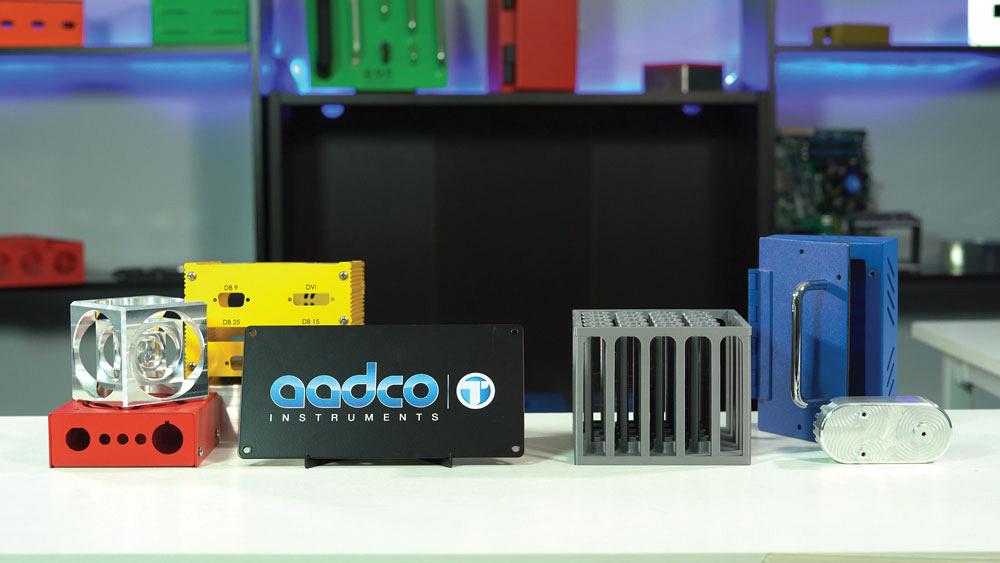
These enclosures were built at Protocase using fabricating processes, machining, and additive manufacturing.
However, that’s not the only segment of the biotech field that’s being affected by this crisis, and it’s not the only product Protocase is working on.
“We’re also working on things like shields for surgery that are necessary now,” he said. “Another customer is developing virus testing equipment. And yet another is working on protein crystallography equipment, which is used in researching viruses and creating vaccines.”
Essential Services
Milburn is clearly proud of the work his company does, but he insists that many other fabricators are also doing essential work every day.
“When people think of essential services, they first think about hospitals,” he said. “But we live in a complex, interconnected world, and when you think about it, there are so many other things that need to keep going. The water utilities have to keep running, power utilities have to stay on, truckers need to keep going, sewage treatment needs to happen, garbage collection – these are what keep us from experiencing other diseases like bubonic plague and cholera. And if truckers can’t work, we can’t get groceries. And fabricators keep all of these operations going.
“The U.S. is much clearer about what constitutes an essential service than we are here,” he continued. “It’s all set out in the Homeland Security Act. When I look at that list, I see that we serve at least 15 other essential services on that list. That’s why I think the work that other fabricators are doing is every bit as important as the work done in the health-care sector directly.”
Staying Open for Business
Milburn has been, as he puts it, “respectively and constructively critical” of how governments have communicated how to manage day-to-day interactions during the pandemic.
“A real panic develops when there is a lack of information,” he explained. “Governments have loaded us up with public health restrictions, but there has been little communication of what you should do instead. It’s easy to say don’t do this or don’t do that, but then the panic builds because people are unclear about how they should act. A good example is being told not to touch your face. That’s difficult to avoid. What is important is that if you have been out in public, you need to wash your hands thoroughly when you return home.”
Milburn was concerned about protocols some time before COVID-19 began to spread in Canada, so he had a consultant who studies epidemiology come in to tell his team what they might be dealing with.
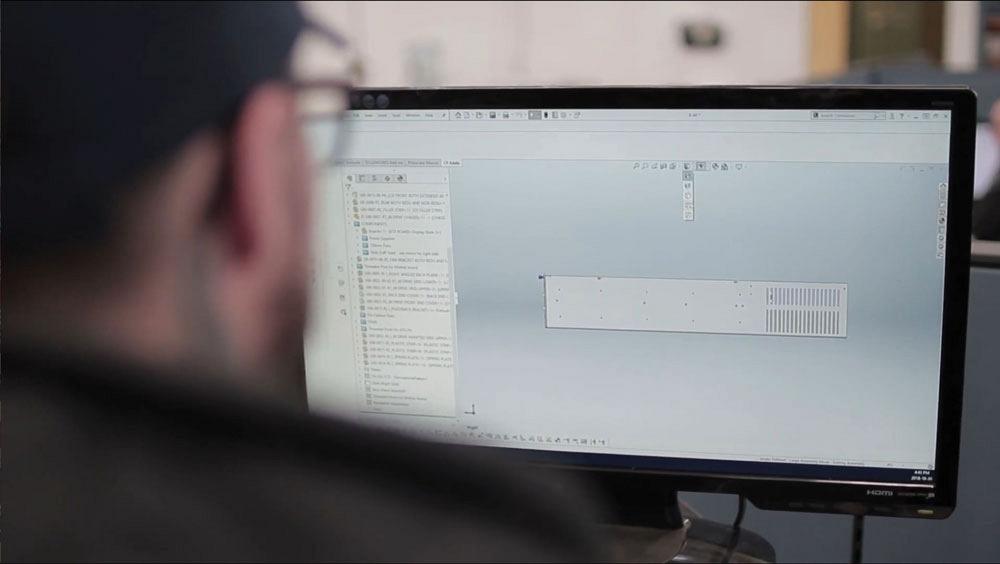
The work that Protocase does is necessarily software development-intensive, and much of it is automated. Here one of the company’s engineers in Engineering and Design Services works on a CAD drawing.
“We just wanted to know, is this Ebola? Is it similar to a seasonal flu? Obviously, it’s neither of those things, but the consultant came in and told us what it was and what we needed to do to prepare. They put the risks into perspective for us and we took everything in the public health guidelines and we follow those.”
The basic rules at Protocase are the same as what we have all come to recognize as the key elements of managing the environment:
- Implement a 6-ft. distance rule, keeping 6 ft. away from co-workers.
- Follow social distancing guidelines.
- Wash your hands thoroughly and regularly.
These are guidelines for a reason – it’s not always possible to keep 6 ft. away when passing someone in a hallway – but otherwise these rules are mandated and managed effectively.
The business also does a regular group cleaning of the office.
“Several times a day someone will crank some music in the office, and we will all take out wipes and wipe down all the surfaces in our work areas and common areas,” said Milburn.
Information Flow
Protocase’s approach to helping its customers is somewhat the same as educating its staff about COVID-19 protocols; it gives customers as much information as it can about the business so customers better understand how Protocase can help them.
For instance, the company website includes videos about paint finishes and information on fabrication tolerances and bend radii. While some customers already know this, It’s a starting point for potential questions for others. When turnaround times are expected to be two or three days, information is power. Information will help us through this pandemic as well. We’ll get there.
And that was Milburn’s upbeat, encouraging final words to Canadian Fabricating & Welding: “We’ve got to keep things going. We’re going to get through this together. Our society is such a complex web that needs to keep going, and fabricators are a critical part of that.”
Editor Robert Colman can be reached at rcolman@canadianfabweld.com.
Protocase, protocase.com
About the Author

Rob Colman
1154 Warden Avenue
Toronto, M1R 0A1 Canada
905-235-0471
Robert Colman has worked as a writer and editor for more than 25 years, covering the needs of a variety of trades. He has been dedicated to the metalworking industry for the past 13 years, serving as editor for Metalworking Production & Purchasing (MP&P) and, since January 2016, the editor of Canadian Fabricating & Welding. He graduated with a B.A. degree from McGill University and a Master’s degree from UBC.
subscribe now


Keep up to date with the latest news, events, and technology for all things metal from our pair of monthly magazines written specifically for Canadian manufacturers!
Start Your Free Subscription- Trending Articles
Aluminum MIG welding wire upgraded with a proprietary and patented surface treatment technology

Achieving success with mechanized plasma cutting
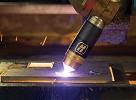
Hypertherm Associates partners with Rapyuta Robotics

Gema welcomes controller

Brushless copper tubing cutter adjusts to ODs up to 2-1/8 in.
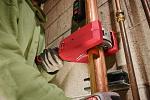
- Industry Events
MME Winnipeg
- April 30, 2024
- Winnipeg, ON Canada
CTMA Economic Uncertainty: Helping You Navigate Windsor Seminar
- April 30, 2024
- Windsor, ON Canada
CTMA Economic Uncertainty: Helping You Navigate Kitchener Seminar
- May 2, 2024
- Kitchener, ON Canada
Automate 2024
- May 6 - 9, 2024
- Chicago, IL
ANCA Open House
- May 7 - 8, 2024
- Wixom, MI













